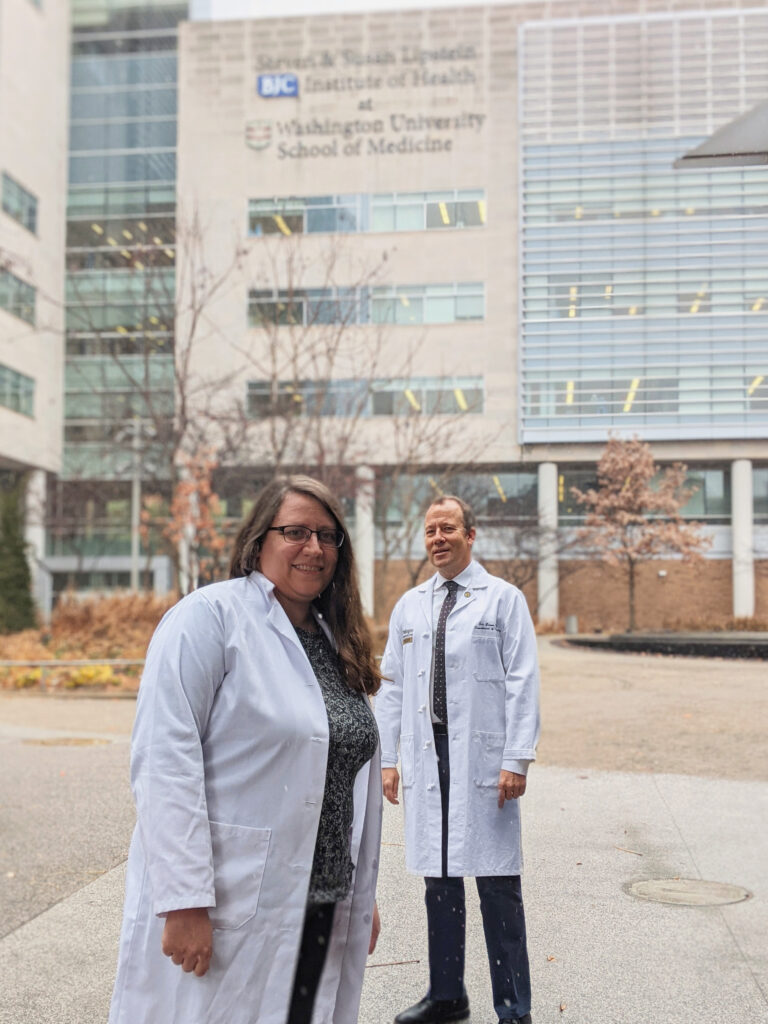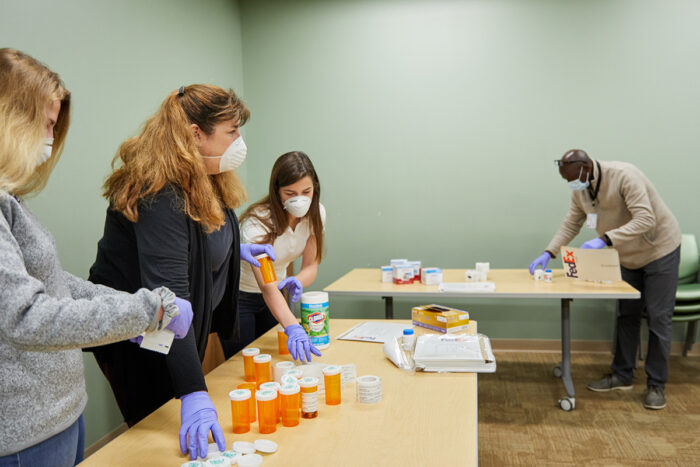The proverbial saying ‘Necessity is the mother of invention’ is frequently used to explain how great innovations are made during times of urgent need. Never has the need been direr than when the COVID pandemic hit in March 2020 and health care providers were struggling to find treatments for patients fighting this new and deadly disease. It was during this time, ICTS investigator Eric Lenze, MD, the Wallace and Lucille K. Renard Professor of Psychiatry at Washington University School of Medicine, was contemplating research on the pandemic when a colleague suggested an idea to repurpose the drug fluvoxamine as an early treatment for COVID-19. With a depth of experience in clinical trials, Lenze found himself uniquely positioned to implement a fully remote and contactless trial, an innovative study design that became a necessary tactic due to the COVID pandemic’s restrictions on face-to-face contact.
An idea is born

Back in March, Lenze received an email from his colleague, Angela Reiersen, MD, MPE, Washington University School of Medicine Associate Professor of Psychiatry, where she laid out a compelling argument to use fluvoxamine to prevent clinical deterioration in COVID-19 patients. Reiersen recalled her experience working with patients with Wolfram syndrome, a rare genetic disorder affecting cellular stress responses, which can lead to juvenile-onset diabetes, optic nerve atrophy, and neurodegeneration. Reiersen had noticed that individuals with this genetic condition seemed to respond differently to antidepressants depending on the drugs’ actions at the sigma-1 receptor, a protein which regulates cells’ responses to stress and inflammatory triggers. Due to her research on this topic, she knew of a 2019 study showing beneficial effects of fluvoxamine (a sigma-1 receptor activator) in treatment of inflammation and sepsis. She wondered whether this drug could be repurposed to prevent the excessive inflammatory response that causes severe breathing problems in COVID.
Implementing a fully remote, contactless clinical trial
The university’s Department of Psychiatry and Division of Infectious Diseases formed a collaboration to test this hypothesis. And, while the pandemic disrupted research around the world, Lenze was able to successfully conduct this trial with 152 COVID-19 patients within the greater St. Louis area. The findings were published in the Journal of the American Medical Association in November, less than eight months after the idea was first conceived.
“What made this study unique was that every aspect of the study was remote; we had no face-to-face contact with participants. Screening, recruitment of individuals, consenting, carrying out assessments, supplying the intervention all had to be done via telephone and internet,” said Lenze. “This was necessary for obvious reasons: these were individuals who had a contagious disease, and they were self-quarantining.”

MATT MILLER/WASHINGTON UNIVERSITY SCHOOL OF MEDICINE
The study team’s contact with participants throughout the trial was frequent even though never physically in person. Patients used an online study portal where they entered daily information on their status including their symptoms, vital signs, and oxygen saturation. It was through this frequent communication, that the research team was able to determine whether they were taking the medication, what symptoms they had, and if they were clinically deteriorating.
Lenze was well-prepared for this type of contactless trial from his past research and work, much of it supported by the ICTS. In 2018, Lenze received the ICTS STAR award that provided pilot funds for a study in depressed older adults that was conducted entirely through their smartphones. With this research, Lenze was able to test that fully remote clinical trials are a feasible and efficient way of conducting clinical research.
Lenze’s success helped to spur a new research core at the School of Medicine established and supported by the ICTS. The mHealth Research Core, launched in 2019 and directed by Lenze and Ginger Nicol, MD, Washington University School of Medicine Associate Professor of Psychiatry, focuses on utilizing mobile technology like social media, smartphone devices, tablets, web sites, sensors and or wearables to measure and improve health research. By providing guidance, consultative services and resources, the mHealth Research Core helps other investigators with incorporating mHealth tactics into their research. Demand for services from the Core has grown exponentially in the past year as researchers have initiated COVID-19 research and have transitioned existing studies from conventional protocols to fully-remote operations. To meet this demand, Lenze applied and received a STAR award in 2020 for his proposal “The mHealth Core and COVID-19: Fast-Tracking Research during a Pandemic”.
Lenze attributes much of the speedy implementation of a fully remote trial for fluvoxamine to the mHealth Research Core. “The ICTS direct support of the mHealth Research core was instrumental in providing that base of the knowledge and expertise in conducting remote research,” reflects Lenze. “And now, with the need accelerated due to COVID, we are able to help other researchers navigate remote clinical research.” ICTS investigators can request a consult from the mHealth Research Core at mhealth.wustl.edu.
COVID-19 and the future of clinical trials
At this time, Lenze and his team are working to confirm their initial study findings on a larger scale with a national, multi-center, fully remote trial. Research is currently underway, with a plan to include over 1,000 participants across five trial sites in the United States and Canada.
Lenze says that COVID has exposed the need to make clinical research studies more adaptive and flexible. “More clinical research is going to be carried outside of the walls of the academic medical center,” predicts Lenze. “This pandemic forced us to take the study to the patient, instead of vice versa. This ultimately increases the accessibility of clinical research for all patients.”